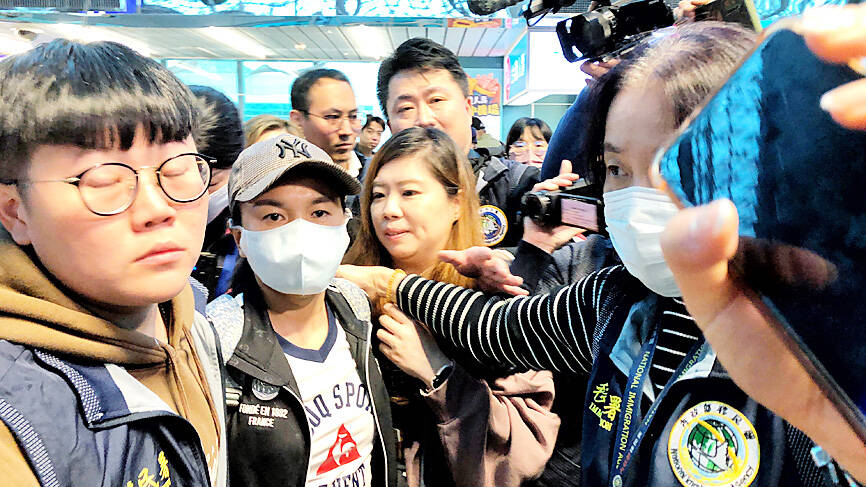A Chinese national whose dependent-based residency permit was revoked over social media posts that advocated China using military force to unite with Taiwan was forcibly deported yesterday after failing to leave the country before the deadline of her deportation order.
Known by her online pseudonym Xiaowei (小微) on the Chinese social media platform Douyin, the pro-China influencer boarded a flight to Guangzhou, China, at 2:10pm from Taiwan Taoyuan International Airport.
Xiaowei, whose marriage to a Taiwanese citizen provided the basis for her long-term residency in the country, reported to the National Immigration Agency (NIA) earlier yesterday.

Photo: CNA
Immigration agency personnel then escorted her to the airport.
“There’s nothing wrong with being a dignified Chinese citizen,” she shouted to reporters at the airport. “Taiwanese authorities are forcibly deporting me. Is it wrong to love my family and my country?”
The NIA has said that Xiaowei, whose given name is Zhao Chan (趙嬋), repeatedly advocated for China’s military takeover of Taiwan on Douyin, leading to the revocation of her residency permit.
The NIA, in a news release on March 21, said Xiaowei published several videos online, which included provocative remarks such as “The streets of Taiwan are filled with the five-star red flag,” referring to the flag of China.
The agency ordered her to leave Taiwan within a 10-day period. However, as she refused to comply, the authorities held a deportation review meeting yesterday morning and decided to forcibly remove her.
Mainland Affairs Council Minister Chiu Chui-cheng (邱垂正) said that while the government respects the NIA’s decisions, it urges the public to be more inclusive and supportive, particularly toward Chinese spouses and other new immigrants.
“The small number of Chinese spouses who have made inappropriate remarks should not affect other new immigrants who identify with and care for Taiwan,” he said.
Xiaowei’s deportation follows the recent cases of two other Chinese nationals, Enqi (恩綺), real name Zhang Yan (張燕), and Liu Zhenya (劉振亞), who goes by “Yaya in Taiwan” (亞亞在台灣), both of whom also lost their residency status last month for posting content advocating “military unification.”
Enqi left Taiwan on Monday, while Liu departed on Tuesday last week.
The NIA yesterday reiterated that it would take strong legal action against any foreign nationals who publicly advocate the invasion of Taiwan or elimination of its sovereignty.

Right-wing political scientist Laura Fernandez on Sunday won Costa Rica’s presidential election by a landslide, after promising to crack down on rising violence linked to the cocaine trade. Fernandez’s nearest rival, economist Alvaro Ramos, conceded defeat as results showed the ruling party far exceeding the threshold of 40 percent needed to avoid a runoff. With 94 percent of polling stations counted, the political heir of outgoing Costa Rican President Rodrigo Chaves had captured 48.3 percent of the vote compared with Ramos’ 33.4 percent, the Supreme Electoral Tribunal said. As soon as the first results were announced, members of Fernandez’s Sovereign People’s Party

MORE RESPONSIBILITY: Draftees would be expected to fight alongside professional soldiers, likely requiring the transformation of some training brigades into combat units The armed forces are to start incorporating new conscripts into combined arms brigades this year to enhance combat readiness, the Executive Yuan’s latest policy report said. The new policy would affect Taiwanese men entering the military for their compulsory service, which was extended to one year under reforms by then-president Tsai Ing-wen (蔡英文) in 2022. The conscripts would be trained to operate machine guns, uncrewed aerial vehicles, anti-tank guided missile launchers and Stinger air defense systems, the report said, adding that the basic training would be lengthened to eight weeks. After basic training, conscripts would be sorted into infantry battalions that would take

GROWING AMBITIONS: The scale and tempo of the operations show that the Strait has become the core theater for China to expand its security interests, the report said Chinese military aircraft incursions around Taiwan have surged nearly 15-fold over the past five years, according to a report released yesterday by the Democratic Progressive Party’s (DPP) Department of China Affairs. Sorties in the Taiwan Strait were previously irregular, totaling 380 in 2020, but have since evolved into routine operations, the report showed. “This demonstrates that the Taiwan Strait has become both the starting point and testing ground for Beijing’s expansionist ambitions,” it said. Driven by military expansionism, China is systematically pursuing actions aimed at altering the regional “status quo,” the department said, adding that Taiwan represents the most critical link in China’s

‘REALLY PROUD’: Nvidia would not be possible without Taiwan, Huang said, adding that TSMC would be increasing its capacity by 100 percent Nvidia Corp CEO Jensen Huang (黃仁勳) on Saturday praised and lightly cajoled his major Taiwanese suppliers to produce more to help power strong demand for artificial intelligence (AI), capping a visit to the country of his birth, where he has been mobbed by adoring fans at every step. Speaking at an impromptu press conference in the rain outside a Taipei restaurant, where he had hosted suppliers for a “trillion-dollar dinner,” named after the market capitalization of those firms attending, Huang said this would be another good year for business. “TSMC needs to work very hard this year because I need a lot